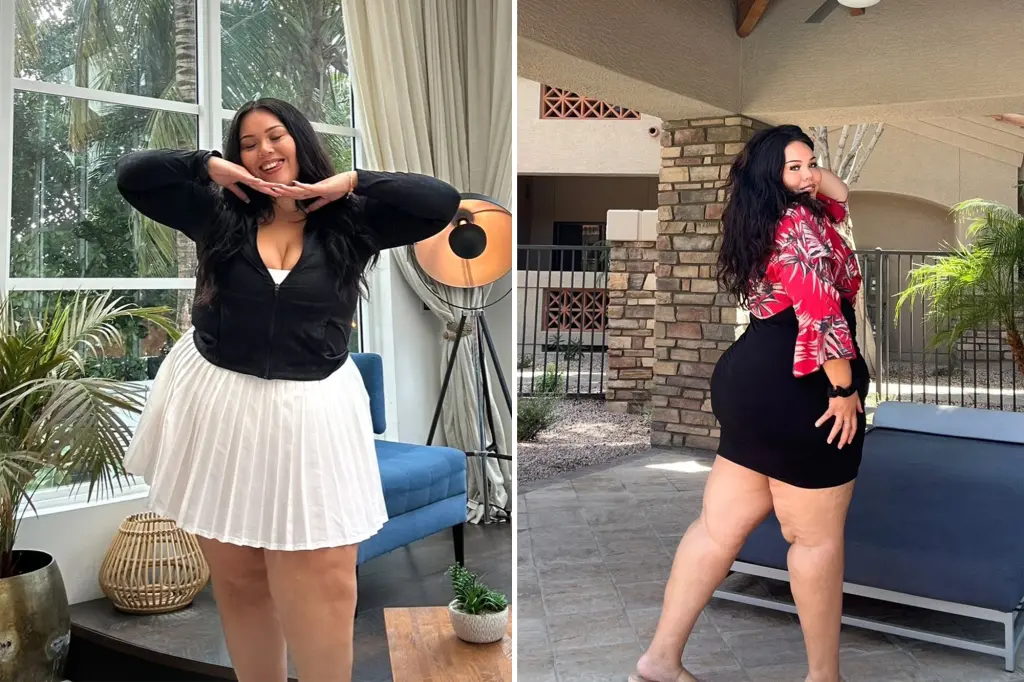Embracing Body Positivity: Julia Sena’s Journey to Self-Acceptance and Empowerment
In a world often dominated by narrow beauty standards, 30-year-old Julia Sena from Phoenix, Arizona stands tall—literally and figuratively—as a beacon of body positivity. The self-described “fat and fine” influencer has amassed over 121,000 followers on Instagram, where she boldly challenges societal norms about size and fashion. At 320 pounds, Sena refuses to let her weight dictate what she wears or how she presents herself to the world. “Fashion isn’t age restricted and beauty isn’t just for one size,” she firmly believes, a mantra that has become the cornerstone of her online presence. Through her vibrant and unapologetic content, Sena showcases herself in miniskirts, tight dresses, and other outfits that plus-size individuals have traditionally been discouraged from wearing, sending a powerful message to her followers that everyone deserves to express themselves through fashion regardless of their body type.
Sena’s journey to self-acceptance has been anything but smooth. Throughout her life, she has faced relentless fat-shaming and dehumanizing comments, with critics comparing her to “large animals” and even “pieces of furniture.” Beyond these cruel comparisons, Sena has also had to navigate the uncomfortable terrain of being hypersexualized and fetishized simply because of her size. “People want to know what it’s like to date a BBW [Big Beautiful Woman] not just because I am one, but because of the harmful stereotypes people associate with it,” she explains. These stereotypes often cast plus-size women as “more submissive, easier to get, and being treated as an object just for their personal pleasure.” Such experiences highlight the double-edged sword that many plus-size individuals face: either being completely desexualized or reduced to a fetish, both of which deny their full humanity and individuality.
Despite these challenges, Sena has developed a resilient approach to combating negative perceptions. She deliberately uses affirming phrases like “fat and fine,” “big and beautiful,” and “hot and heavy” to help reshape the way people view larger bodies. This linguistic reframing is part of her broader strategy to challenge fat-phobia and promote a more inclusive understanding of beauty. “Since I now validate myself, my beauty and my body, I don’t get as down as I used to,” she shares, pointing to the power of self-affirmation in building resilience against external criticism. In one particularly defiant Instagram video captioned “320lbs of idgaf about what you think about my body,” Sena proudly sports a revealing miniskirt and short top while confidently posing for the camera. The response from her followers has been overwhelmingly positive, with comments like “more of this energy in the world please” and “Love ur energy, continue Queenin” accompanied by supportive emojis, suggesting that her message resonates deeply with many people who are hungry for more diverse representations of beauty.
The influencer’s advocacy extends beyond personal style choices to address broader issues of representation in media and society. Sena points out that “plus-size people don’t get a whole lot of representation,” and when they do appear in mainstream media, they’re often relegated to stereotypical roles like the “fat funny friend” or portrayed as ashamed of their bodies. These limited and often negative portrayals contribute to a culture where larger individuals feel invisible or unworthy. By contrast, Sena’s content offers an alternative narrative—one where plus-size people are confident, fashionable, and deserving of respect. “Fat people deserve love, dignity and respect too,” she asserts, challenging the notion that worthiness is somehow tied to waistlines. Her commitment to “creating a space online where people can feel comfortable in the skin they’re in” represents an important counterbalance to the weight stigma that permeates much of society and media.
Amidst the “constant negativity” that Sena has faced throughout her life, she acknowledges that she’s “also experienced tons of love.” This balanced perspective allows her to recognize both the challenges and the support she’s received on her journey. It also informs her approach to advocacy, which focuses not on vilifying others but on expanding conceptions of beauty and worthiness. As she continues to share her life online, Sena emphasizes the inherent value of all bodies, regardless of size. “This big beautiful body has carried and supported me through the ups and downs of life, relationships ending, the good, the bad and the ugly and so much more—my body has been there through it all,” she reflects with gratitude. This appreciation for her body’s resilience and strength represents a profound shift from viewing it as something to be hidden or changed to recognizing it as a faithful companion that deserves celebration.
Through her bold presence and unwavering self-confidence, Julia Sena offers an inspiring example of living authentically in a society that often pressures individuals to conform to restrictive beauty standards. Her final message encapsulates the heart of her philosophy: “My weight doesn’t determine my worth, but I hope you know your weight doesn’t define your worth either.” This simple yet powerful statement serves as both a personal affirmation and an invitation to others to free themselves from the tyranny of the scale. By sharing her journey so openly, Sena not only reclaims her own narrative but also creates space for others to do the same. In a culture where weight stigma remains pervasive, her voice represents an important contribution to the ongoing conversation about body diversity and acceptance. As she continues to don her miniskirts and tight dresses with pride, Sena isn’t just making a fashion statement—she’s making a profound declaration about human dignity that transcends size, shape, and appearance.


